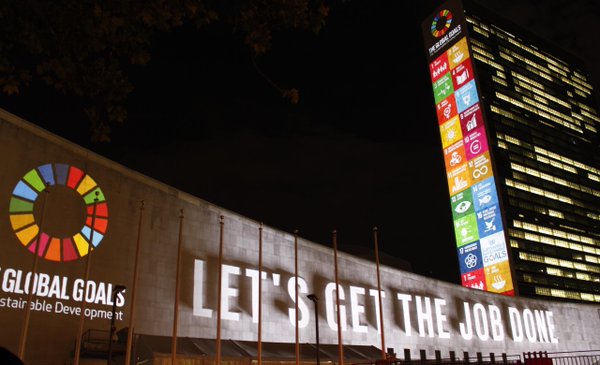24th November 2015 London, UK
Lessons from #UNGA: it’s all about content

Last month saw the opening of the 70th session of the United Nations General Assembly. For the digital leaders out there, this phenomenon was known simply as “#UNGA.” But this year’s UNGA had a different feel from the previous 69 sessions.
It was distinctly digital.
Twitter hosted meetings with diplomats and ambassadors at their New York offices. Invitations to high level events included the handles of hosting governments. A giant #UNGA hashtag was assembled at the entrance of the United Nations.
It was safe to say that expectations were at an all time high for digital work. As a Permanent Member of the UN Security Council, the UK Mission to the United Nations in New York (UKMis New York) set a goal to match and go beyond these expectations to lead the pack of diplomatic posts in New York. In short, the goal was to win UNGA.
By reaching an unprecedented number of people over an eight day period, publishing our highest performing content on all of our platforms, and expanding into new initiatives like Vine and Periscope, UKMis New York achieved this goal. In addition to setting records in virtually all categories for social engagement, our top tweets were some of the most widely retweeted among those using #GlobalGoals.
So how did we do it?
We learned specific lessons from UNGA that digital champions throughout the FCO network can draw from. The biggest of these is that content is king. Within this lesson, there are three takeaways that I feel can improve every post’s online engagement.
1.) Timely content
Throughout the hundreds of events at UNGA, Missions, Heads of State, Ministers, and thousands of attendees took to Twitter. With this high level of live engagement, if we waited 5 minutes to tweet about a meeting, it was old news. Being prepared for the biggest events and having flexibility to adapt to changes in the program helped us to stay out in front to spotlight UK initiatives at UNGA.
2.) Visual content
UKMis New York published roughly 160 original tweets over the course of UNGA. Over 91% had at least one photo, periscope feed, or YouTube video link in them. Mixing in a text based tweet every now and then is good practice. However, if you’re tweeting more text than visuals, you’re missing opportunities.
3.) Innovative content
Online audiences are always looking for something different. Just because we’re tweeting from government accounts, doesn’t mean we can’t use the latest trends to amplify the priorities of the United Kingdom. While other groups at UNGA took a more classical approach to Twitter, we aimed to publish Twitter Collections, GIFs, Vines, Buzzfeed-style lists via Tumblr, and a Spotify playlist. This content paid off and helped us reach 1.4 million people in just over one week.
Along the path that led to each of these lessons, the UK Mission to the UN demonstrated what the United Kingdom has become known for on social media: digital diplomacy.
This diplomacy put British values and the core priorities of the United Kingdom in front of hundreds of thousands of people that would not normally see them. The difference between a statement that concludes with “leave no one behind” and a tweet with #LeaveNoOneBehind is subtle. Each is an important tool in communicating the UK’s commitment to development and the 17 Global Goals.
However, by utilizing both, we project this critical message not only to those watching in the halls of the UN, but to people on coffee shop wifi networks, on smart phone screens wielded in train cars, and to students on laptops in dorm rooms from Cambridge to California. And the message goes further than the Global Goals. This global audience now knows more about British contributions to Peacekeeping, our stance on marriage equality, and our growing concern on crises like Yemen and Syria to name but a few.
Our digital diplomacy during UNGA helps the UK further establish its global leadership from the center of multilateral diplomacy.
The United Kingdom plays a critical role in nearly every facet of the world’s multilateral diplomacy. From security to development, we have an important and ongoing story to tell.
Thanks in part to our digital efforts during UNGA, more than one million people have began to hear that story.
